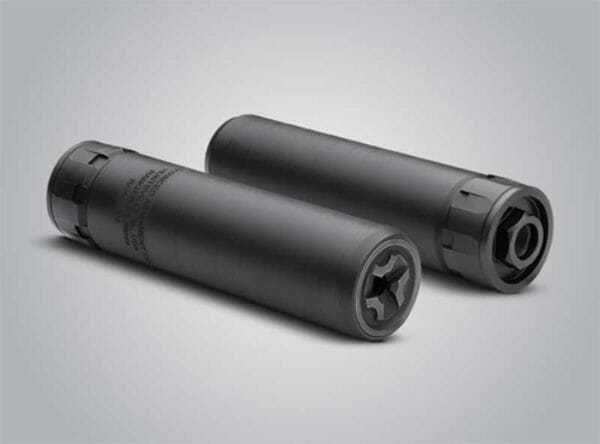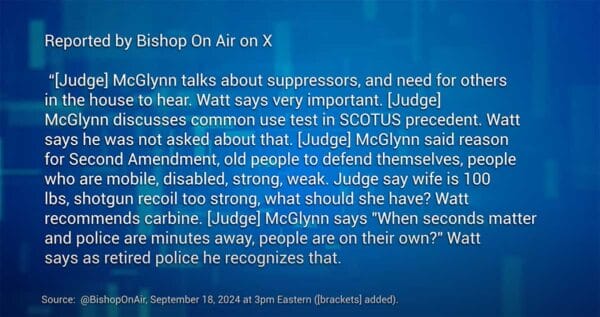Editor’s Word: Choose Stephen McGlynn is at present presiding over a number of consolidated instances difficult Illinois’ “assault weapons” ban, together with Harrel v. Raoul, Barnett v. Raoul, Langley v. Kelly, and Foster v. Raoul. These instances collectively query the constitutionality of the state’s restrictions on firearms and large-capacity magazines below the Second Modification.
Moreover, Choose McGlynn is overseeing Carlin Anderson vs. Kwame Raoul, referenced beneath, which challenges Illinois’ ban on suppressors. The result of this case holds vital implications for gun rights advocates nationwide, notably concerning the authorized standing of suppressors as protected “arms.”
Hat tip to Greg Bishop of Bishop On Air for his wonderful real-time protection of those proceedings.
The continuing battle for Second Modification rights took heart stage within the courtroom as soon as once more within the 2nd Modification problem to Illinois’ assault weapons ban. Nonetheless, as that case proceeds, Mark Smith notes a few of the takeaways that will impression the upcoming case of Carlin Anderson vs. Kwame Raoul.
On the coronary heart of the 2nd case, Carlin Anderson vs. Kwame Raoul is the authorized battle of Illinois’ ban on suppressors—a essential piece of laws that has ignited passionate debates about its constitutionality. The implications of this case prolong far past state strains, with the potential to set a precedent in suppressor regulation throughout the nation. U.S. District Court docket Choose Stephen McGlynn’s courtroom has develop into a pivotal battleground in figuring out whether or not these firearms equipment, usually demonized by huge Hollywood and anti-gun advocates, fall below the safety of the Second Modification.
Choose McGlynn’s Connection of the Dots
Mark Smith of the “4 Packing containers Diner” YouTube channel highlighted a big growth within the Anderson case, noting that Choose McGlynn’s remarks throughout the Illinois assault weapons ban trial counsel a profound understanding of firearm expertise and its position in self-defense. McGlynn’s observations, backed by skilled testimony, underscored that suppressors, which shield listening to throughout firearm use, serve a essential security perform quite than posing a public risk. The truth is, Smith linked the choose’s discourse on suppressors to the common-use check established by the Supreme Court docket, mentioning that suppressors enhance firearm use by making them safer—each for the person and people close by.
Choose McGlynn’s dialog with skilled witnesses throughout the trial delved into how suppressors align with the fitting to self-defense. As McGlynn identified, firearms might be loud and disorienting in moments of self-defense, probably harming these attempting to defend themselves. Suppressors reduce this danger by dampening the sound, making them extra environment friendly and safer for lawful firearm house owners.
By linking suppressors to the facilitation of self-defense, McGlynn appeared to align with the concept suppressors qualify as “arms” below the Second Modification.
Suppressors as Arms: A Constitutional Argument

One of many key authorized arguments in Anderson vs. Raoul, embedded beneath, revolves round whether or not suppressors ought to be thought-about “arms” below the Second Modification.
The U.S. Supreme Court docket, in instances like Heller and Bruen, has established that the Second Modification protects firearms and equipment utilized in widespread lawful functions like self-defense. Smith emphasised that suppressors are utilized by thousands and thousands of Individuals and are neither “harmful” nor “uncommon,” an ordinary set by the Court docket for figuring out whether or not an merchandise might be banned. There are over three million legally registered suppressors in america, demonstrating their commonality.
“Suppressors facilitate armed self-defense,” Smith defined, reinforcing the concept they meet the factors established in Bruen. The burden of proof, subsequently, falls on the state to exhibit a historic custom of banning suppressors—one thing that historical past doesn’t assist.
Illinois’ Ban and McGlynn’s Judicial Perception
Illinois, alongside a number of different states, took the step of banning suppressors outright, a transfer that Carlin Anderson case is difficult primarily based on Second Modification grounds. In distinction, federal regulation, below the Nationwide Firearms Act (NFA), permits suppressors however closely regulates their sale and switch. Illinois’ extra aggressive stance on the problem has sparked authorized pushback, with Choose McGlynn now tasked with navigating the nuances of federal and state regulation as they intersect with constitutional rights.
In a current listening to, Choose McGlynn questioned why his spouse, weighing round 100 kilos, could be anticipated to defend herself with a 12-gauge shotgun when a carbine is likely to be a extra sensible and fewer bodily taxing choice.
His question underscored the broader level that firearms, and by extension their equipment, serve various features relying on the person’s wants. For people with bodily limitations, suppressors and different equipment can considerably improve their capability to defend themselves successfully. This line of considering means that McGlynn is weighing the human elements concerned in self-defense eventualities, making it clear that suppressor bans may disproportionately hurt people who depend on these instruments for lawful safety.


What’s at Stake?
Carlin Anderson vs. Kwame Raoul isn’t just about suppressors—it’s in regards to the very essence of the Second Modification. Ought to the court docket rule in Anderson’s favor, it could affirm the concept suppressors are, certainly, protected “arms” below the Structure and that the state of Illinois has overstepped its authority by enacting a complete ban. However, if the court docket sides with Raoul, it could bolster state efforts to enact extra restrictive firearm accent legal guidelines sooner or later, setting a harmful precedent for gun house owners nationwide.
In his evaluation, Smith was optimistic about the way forward for suppressor rights, noting that Choose McGlynn’s understanding of firearms and his software of Supreme Court docket precedents counsel a possible victory for Anderson. With McGlynn already connecting the dots between suppressors and the Heller and Bruen choices, the case appears to be heading towards a pivotal second that might reshape suppressor laws throughout the nation.
Dwell Stock Worth Checker
Wanting Forward
The result of the upcoming Carlin Anderson vs. Kwame Raoul might have far-reaching implications, not just for Illinois gun house owners however for Second Modification rights nationwide. As Choose McGlynn continues to preside over this essential case, pro-gun advocates like Mark Smith stay vigilant, hopeful that the court docket will acknowledge suppressors as important instruments for self-defense. This case, alongside others difficult Illinois’ restrictive gun legal guidelines, represents a vital second for gun rights in America, with the potential to uphold the rights of law-abiding residents to defend themselves with the very best instruments out there.
Because the case strikes ahead, pro-gun supporters are inspired to remain knowledgeable and lively, as these battles within the courtroom will undoubtedly form the way forward for firearm laws in america.
Carlin Anderson vs Kwame Raoul






















